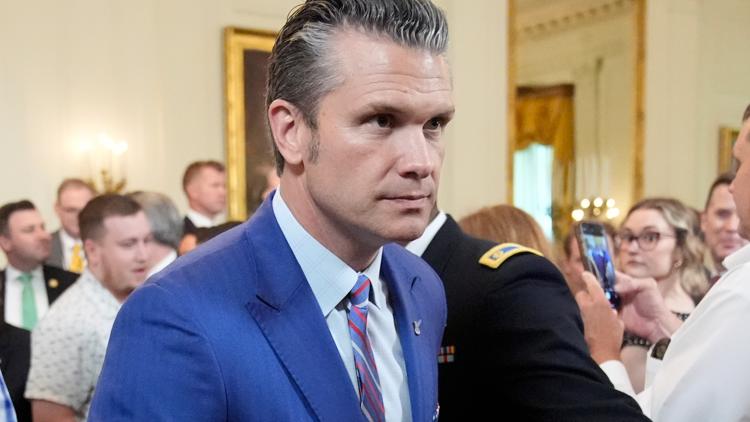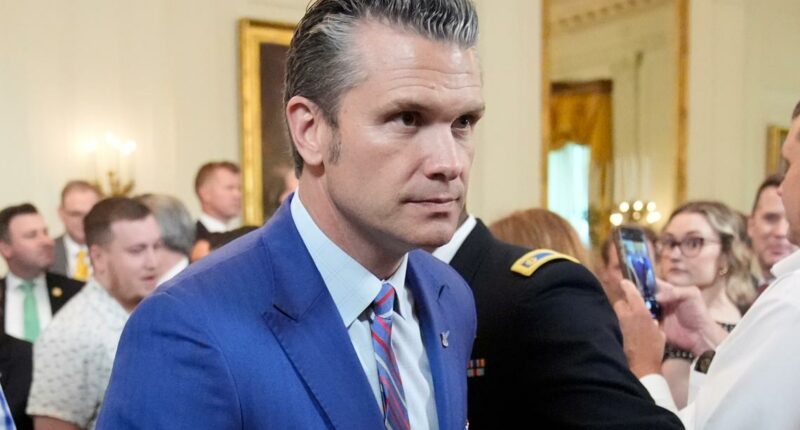Share this @internewscast.com

The Trump administration said it will revoke the press credentials of journalists who do not comply with the new pledge requirements.
WASHINGTON — On Friday, the Pentagon introduced significant new restrictions for journalists covering the Defense Department. These guidelines require reporters to agree not to acquire or circulate any information, even if it’s not classified unless the government has given explicit permission.
Defense Secretary Pete Hegseth announced these regulations, which drastically restrict journalists’ capacity to report on Pentagon affairs. This represents an extraordinary step that grants the military extensive control over the publication of defense-related topics by the media.
The Trump administration indicated that press credentials would be revoked for journalists who fail to adhere to the new requirements. These comprehensive rules, necessary for accessing the Pentagon, prohibit any “unprofessional conduct that may hinder Pentagon operations,” as well as any “attempts to improperly acquire” information, both classified or regarded as “controlled,” according to a document shared with reporters.
“The Pentagon is accountable to the people, not the press,” Hegseth stated in a social media post on X. “Journalists can no longer wander freely in a secure facility. Wear an ID and stick to the guidelines — or leave.”
The document distributed to media organizations emphasizes tighter building access, where numerous military and civilian workers are based. Under the new policy, reporters agreeing to the terms can still visit the building with supervision and a defined objective. This marks a first, as reporters from leading news organizations might lose their unrestricted access to non-classified areas.
These regulations provide the Pentagon with the authority to classify journalists as security risks and revoke their press credentials if they gather or disseminate information that the agency considers unsuitable for public disclosure.
The restrictions represent a dramatic escalation in the Trump administration’s efforts to limit press access to the Pentagon. The Pentagon restrictions on media covering the military follow a series of moves by the Trump administration to curtail press access. In January, several major outlets including NBC News, The New York Times, NPR and Politico were told they must vacate their dedicated workspaces in the Pentagon as part of a new “annual media rotation program” for its in-house press corps. Hegseth also began requiring reporters to have an escort to walk through certain areas, even if the spaces are unclassified. Under the new requirements, reporters would be prevented from walking to most areas outside the food court and would have to swap out their badges with bright red or orange passes.
The National Press Club swiftly condemned the restrictions, with President Mike Balsamo calling them “a direct assault on independent journalism at the very place where independent scrutiny matters most: the U.S. military.”
Balsamo warned that the changes would fundamentally alter the public’s access to information about military operations and spending.
“For generations, Pentagon reporters have provided the public with vital information about how wars are fought, how defense dollars are spent, and how decisions are made that put American lives at risk,” he said. “That work has only been possible because reporters could seek out facts without needing government permission.”
“If the news about our military must first be approved by the government, then the public is no longer getting independent reporting. It is getting only what officials want them to see,” the statement continued. “That should alarm every American.”
The Pentagon will also require reporters to sign a document pledging to protect “sensitive information,” likely setting up situations where unfavorable reporting involving documents could be used as pretense to strip journalists of access to the building.
The restrictions mark a significant departure from decades of Pentagon press operations, where journalists have traditionally been able to seek information and sources without explicit government authorization, as long as they followed established protocols for handling classified material.
It was not immediately clear how many news organizations would comply with the new pledge requirements or how the restrictions would affect ongoing Pentagon coverage.

















